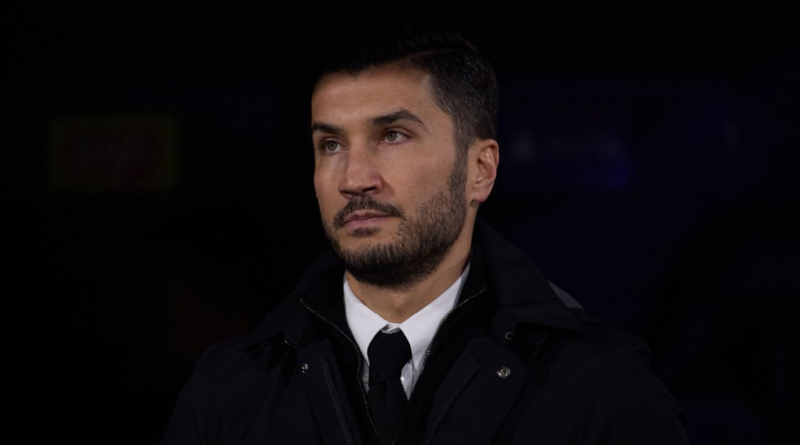Dortmund's issues run deeper than the dugout
A little more than a year after Nuri Şahin returned to Borussia Dortmund, when he first joined as Edin Terzić’s assistant before eventually becoming his successor, Şahin was dismissed as the club’s manager on Wednesday.
Şahin took over from Terzić last summer because Dortmund’s higher-ups believed that the former midfielder could instill within the team a new identity, but effectively, nothing has changed. In fact, Dortmund are worse off now than they were in the final season with Terzić at the helm.
Following a 2-1 loss to Bologna on Tuesday, Dortmund are 13th in the UEFA Champions League league phase. Even more alarming have been Dortmund’s Bundesliga results, with consecutive losses to Bayer Leverkusen, Holstein Kiel and Eintracht Frankfurt following the Christmas break. They are currently 10th in the standings, a barely believable 20 points adrift of leaders Bayern Munich, and in real danger of failing to qualify for next season’s Champions League.
“After four losses in a row, with only one win in the past nine games and being 10th in the Bundesliga standings, we have unfortunately lost faith that we can achieve our goals with the current setup,” Lars Ricken, the CEO for sport at Dortmund, said.
Even before Tuesday’s loss to Bologna, Dortmund were already looking for a replacement for Şahin. A list of potential candidates includes former Bayern Munich coach Niko Kovač as well as Urs Fischer and Roger Schmidt.
Şahin might have been able to save his job by beating Bologna, but even then, the 36-year-old would have been on borrowed time. Sources inside the club don’t necessarily question his managerial abilities but rather see his unsuccessful stint as the result of circumstances.
Given the fact that Şahin is an inexperienced coach, it was quite likely too much to ask to turn around such a large, meandering ship.
In the previous two seasons, Terzić often attempted to force Dortmund into an underdog role and play reactive football, especially in games against top teams like Bayern and Leverkusen. What somehow worked in last year’s surprise run to the Champions League final was anything but an effective strategy domestically, where BVB repeatedly struggled against high-pressing or compact defences.
From the moment he arrived, Şahin showed that he had ideas on how to transform Dortmund into a dominant side who use possession to break down opponents. In the summer he talked about his ideas for build-up and the way attacks should be set up, but that was seemingly jettisoned after just a couple of matchdays, and Dortmund reverted to Terzić’s brand of football.
Fascinatingly, hardly anything worked. They played with relatively little possession against VfB Stuttgart in mid-September and lost 5-1, then they played with lots of possession, initiating their build-up from the back repeatedly, and lost 2-1 to Union Berlin.
The Christmas break was seen as a potential chance to reset, affording the Dortmund manager the opportunity to practice some of the attacking ideas he had. Emerging from that hiatus with four consecutive losses littered with defensive mistakes signaled that Şahin’s time was over. Particularly in the final two games, against Frankfurt and Bologna, Dortmund played like a team who were afraid to lose, likely at the behest of Şahin.
Matthias Sammer, an adviser to the club, pointed out that a lack of fitness may have contributed to the recent downfall.
“Physically and mentally, this team is in non-shape,” the former Dortmund player and manager said following the game in Bologna. “Sadly, this team cannot defend, but it cannot attack either.”
Talking to sources in and around the club, it is widely acknowledged that the current slump is not solely Şahin’s fault. His successor will be the fifth manager since 2018, with Terzić having served on two separate occasions during that time.
Sacking Şahin was seen as a last resort because he is well liked and respected among both fans and club officials. In addition, another managerial change gives the team an excuse for how badly they have performed this season. The players were still behind their manager until the very end, which stands in stark contrast to the final weeks of Terzić’s second spell, when parts of the squad revolted against the manager.
Those players bear some responsibility. So, too, do those tasked with scouting, recruiting and signing them — and to a larger degree.
Other than winger Jamie Gittens and midfielder Felix Nmecha, no one has managed to impress this season. Meanwhile, leadership figures such as Emre Can and Julian Brandt rarely play at a level that would inspire their teammates.
While Dortmund have lost major stars in Erling Haaland and Jude Bellingham as well as influential leaders like Marco Reus and Mats Hummels in the past two-plus years, the team remains one of the most expensively assembled squads in the Bundesliga. However, similarly to Manchester United, Dortmund have avoided initiating a full-scale rebuild by transferring several players and refreshing the locker room.
Perhaps the stench of mediocrity could be blown out of the Westfalenstadion if the the squad were overhauled.
For the time being, Dortmund will likely continue to meander until the end of the season, although there is still a realistic chance they end up qualifying for the Champions League once again.
As of now, the likeliest scenario is that Kovač will be hired on a short-term contract, with the option for renewal if he shows that he can elevate this team. While Kovač has not proven to be a tactical marvel at Bayern, AS Monaco or VfL Wolfsburg, he is able to force his teams to play hard and with grit.
The perception is that many of Dortmund’s players are mentally weak and need to be pushed one way or another. Their downturn in form this season has less to do with Şahin and whether he was prepared to turn this team around, and more to do with the quality and mentality of their core group of players — and the judgment of those responsible for their recruitment.


